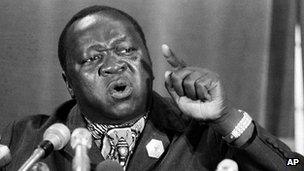Government warned not to repeat 'folly' of Uganda anti-immigration adverts
- Published

Idi Amin exploited resentment towards Asians in Uganda
Ministers have been reminded of the "folly" of Leicester council's 1972 attempt to curb Ugandan immigration with a negative advertising campaign.
Following reports that the government is considering a similar approach in Bulgaria and Romania, the Muslim Forum's Manzoor Mughal described the 1972 campaign as "an act of racism".
"You should not come to Leicester," Ugandan Asians were told.
Around 60,000 Ugandan Asians were ordered to leave the country in 1972.
Under the military dictatorship of Idi Amin, Asians living in the country who had not taken Ugandan citizenship were given 90 days to emigrate.
Some 30,000 Ugandan Asians with British overseas passports arrived in the UK and almost all were granted asylum.
Apology
Leicester's advertising campaign had warned any Ugandan Asians considering settling in the city that it would be against "your own interests and those of your family".
On the BBC's Daily Politics programme, immigration minister Mark Harper said the government wanted to ensure that Bulgarians and Romanians have "a very accurate view about what the deal is here - it isn't a soft touch for benefits".
Pressed on whether that meant the UK would take out adverts in the two countries, he said: "We haven't even thought about it."
In a discussion on BBC Radio 4's Today programme, Mr Mughal said he remembered the Ugandan adverts "very well indeed".
"These adverts came out while we were in Uganda, and it was, I believe, a folly on the part of the city council to take out such adverts and it was tantamount, in my opinion, to an act of racism, which they don't seem to regret, unfortunately."
The council now "celebrates the contribution of the Asian community hugely", he said.
"But they have not shown any remorse for the act of folly," added Mr Mughal, a former chair of Leicester City Council's race relations committee.
He called on the current city council to apologise on behalf of their predecessors.
'Backfired'
Lord Bach, a former Labour minister and Leicester City Councillor in the 1970s - after the campaign - said: "It was far from Leicester's proudest moment."
He accused Mr Mughal of being "perhaps a little unfair" on today's councillors, who had "really condemned what had happened in 1972".
It hadn't been a unanimous decision of the council in 1972, he said, and "there was some upset about it right at the time from some of us in Leicester politics then".
But Lord Bach and Mr Mughal agreed that the campaign had not achieved its aims.
"It was actually almost an advertisement to people to come," the Labour peer said.
"Ugandan Asians were curious to find out why the city council was telling them not to come to Leicester, and they came to see why they were doing so," Mr Mughal explained.
"When they came here... they liked what they saw, and therefore they came in large numbers to settle in Leicester, and therefore the advertisement backfired for the city council.
"But in the long run it has been to the advantage of the city."
'Transformed shopping experience'
Lord Bach concluded: "It was a very long time ago, in very different circumstances, and nothing like that could thankfully ever happen again."
Mark Harper and Chris Leslie on Romanian and Bulgarian immigrants
There have been reports the government is considering a negative advertising campaign in Bulgaria and Romania to avoid large numbers travelling when restrictions on the right to work in the UK ends next year.
In response to those reports, Communities Secretary Eric Pickles has said the UK did not wish to portray itself as "anything other than a very pleasant place to be".
The last Labour government agreed transitional controls on immigration from Bulgaria and Romania when the two countries joined the European Union in 2007, but these expire at the start of next year.
The government has said it is impossible, under EU law, to keep the limits in place any longer.
In a Commons debate in December marking the 40th anniversary of the expulsion of Asians from Uganda, Tory MP Shailesh Vara praised former PM Edward Heath's "courageous decision" that both morally and legally Britain had an obligation to take in the refugees.
He told MPs: "Speaking as a whole for the community, there can be no doubt that this is a community that has punched above its weight in Britain.
"The Ugandan Asians who have settled here have in the past 40 years truly settled and they've truly integrated and become part of the fabric of our nation."
In a parallel debate in the House of Lords, Lord Popat, a Ugandan Asian who moved to the UK in 1971, added: "If you are willing to work hard, learn the language and give back to this great nation, most people do not mind about your skin colour or where you come from."
He credited the Ugandan Asians with "transforming the shopping experience" for British people, introducing "late-night shopping and Sunday opening".
- Published28 January 2013
- Published6 December 2012
- Published25 November 2012